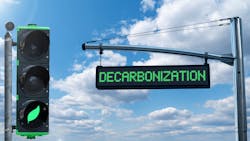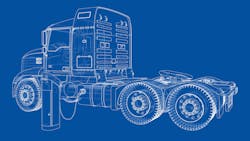New trucking coalition looks to set realistic decarbonization path
It's a long drive between trucking reality and climate politics. But five major industry trade groups are banding together to promote what trucking has accomplished and setting pragmatic expectations for supply chain decarbonization.
"The key to our shared success will be in establishing a realistic timeline and multiple-solution approach that ensures productivity for drivers and reliability within the supply chain for consumers," said Jim Ward, president of the Truckload Carriers Association.
Just last month, ATA President and CEO Chris Spear said the industry's future depends on trucking finding one voice over the journey to zero emission. "The next decade could, if we do not stand up as one and speak rationally, reshape our industry and, as a result, our economy," he said during a speech at ATA's Technology & Maintenance Council annual meeting.
See also: EPA’s new HD emissions rules push manufacturers and fleets to plan aheadThat shared voice will come from the Clean Freight Coalition, launched on March 23 by ATA, TCA, American Truck Dealers, National Tank Truck Carriers, and the Truck and Engine Manufacturers Association. Jim Mullen, a past acting head of the Federal Motor Carrier Safety Administration, will lead the coalition as executive director.
"Trucking is the backbone of our economy and critical to the nation's supply chain," Mullen said Thursday. "It is an honor to lead the CFC in its pursuit to get to zero emissions in a responsible and feasible manner."
Mullen has extensive trucking regulatory, legislative, and legal experience. Before he became the acting administrator of FMCSA, he was the agency's chief counsel. He then spent two years with the autonomous trucking company TuSimple, before stepping down last fall and starting a transportation consulting business.
The coalition's clean mission
- Educate policymakers on the progress the trucking industry has made in reducing emissions and protecting the environment
- Promote the work underway to reduce greenhouse gas emissions from freight transportation
- Advocate for sound public policies that transition toward a zero-emission future in a manner that assures affordable and reliable freight transportation and protects the nation's supply chain.
"Truckload has long been on the road to zero—embracing new advancements in emissions-reducing technology and critical improvements to infrastructure," TCA's Ward said. "For this to happen, we need carrier involvement in all stages of the testing process to help identify operational challenges on the ground. All modes of our industry stand ready to work together to prepare for this essential transition."
See also: EPA poised to grant California more rigid emissions rule than rest of nation
ATA's Spear, on Thursday, highlighted what the industry has already accomplished for the planet, noting that a heavy-duty diesel truck built today is 60 times cleaner than the Class 8 trucks made a generation ago.
"To get to zero, we have to be honest and transparent about the road ahead," he added. "Success depends on a national energy strategy that is inclusive of our industry—the most central and critical link in the supply chain."
Earlier this week, Spear spoke out against California's desire to impose the strictest emissions rules in the nation, pushing fleets to replace their current equipment with more expensive nascent low-emissions vehicles that don't fit into every trucking mode. If the U.S. Environmental Protection Agency grants the Golden State waivers to enforce its clean truck regulations, it could open the door to different truck equipment rules in different states as several other states intend to follow California's lead.
"As we learned in the pandemic, the supply chain can be a fragile thing—and its integrity must be preserved at the national level," the ATA leader said. "This decision has little to do with improving the environment and everything to do with placating the far left of the environmental lobby without regard for the hardworking men and women of our industry or our country who will be left to implement California's vision for America."
Transforming the industry
According to John O'Leary, Daimler Truck North America president and CEO, charging infrastructure is one of the biggest obstacles to decarbonization. He said that the deployment of DTNA's Freightliner eCascadia, a battery-electric regional Class 8 tractor, is being held up by a lack of charging infrastructure nationwide. Unlike other forms of energy, getting enough electricity to power fleets takes a lot more lead time.
"Siting, permitting, and construction delays all mean current lead times are being measured in years—not weeks or months," he told industry media in January. "There's a lot of will in the regulatory and political arenas to make that happen. But as we all know, when you start talking about moving large megawatt lines of electricity around, building new substations, and things like that, it takes time."
See also: Feds help fund freight decarbonization projects from coast to coast
Zero-emissions freight transport is currently achievable for regional operators, who return their equipment to the depot they began the day—if they have on-site charging capabilities. Those regional heavy- and medium-duty trucks can be charged overnight and returned to service the next day.
"The U.S. commercial trucking industry is in the process of transforming, noted Jed Mandel, president of the Truck and Engine Manufacturers Association, which represents OEMs and engine builders. "Truck and engine manufacturers are leading the way to cleaner air through investment, innovation, and engineering."
Mandel added that his association's members spend billions of dollars on research and developing a zero-emission future. "But those investments won't be enough on their own—we also need state and federal leaders to commit to building the essential infrastructures for those vehicles to operate nationwide," he said. "We are committed to working with policymakers to ensure a smooth and successful transition that aligns ZEV production to infrastructure availability."
Studies by the North American Council for Freight Efficiency—based on its Run on Less-Electric demonstrations—found that nearly all medium-duty box trucks, delivery vans, and terminal tractors in use today could be electrified and fit into most fleet operations. NACFE's study also found that half of all Class 8 regional tractors are electrifiable.
Long-haul trucking is not yet ideal for electric trucks because of the enormous weight of batteries, which eat into potential cargo space, and the shorter range of the equipment (and longer charge times) compared to diesel and other internal combustion engine fuels. Other nascent technologies, such as hydrogen fuel cells, could be the answer to long-haul decarbonization. But that technology is still being refined.
An American Transportation Research Institute study noted that an "enormous" amount of electricity would be needed to power the entire trucking industry. And for long-haul trucks to convert to EVs would also cost carriers cargo space and weight because of the large batteries required to power heavy-duty equipment. Truck charging requirements could potentially create what ATRI called the "truck parking 2.0" crisis. Alt-fuel vehicles are also more expensive than traditional trucks with internal combustion engines.
"Carbon-emissions reduction is clearly a top priority of the U.S. trucking industry, and feasible alternatives to internal combustion engines must be identified," Srikanth Padmanabhan, president of the engine business for Cummins, said in response to the ATRI study. "ATRI's research demonstrates that vehicle electrification in the U.S. will be a daunting task that goes well beyond the trucking industry—utilities, truck parking facilities, and the vehicle production supply chain are critical to addressing the challenges identified in this research. Thus, the market will require a variety of decarbonization solutions and other powertrain technologies alongside battery electric."
Another big part of transforming the trucking industry begins with the people who sell the equipment to fleets and independent drivers. "America's truck dealers sell and service the newest, cleanest, and safest trucks available," said Laura Perrotta, President of American Truck Dealers, a National Automobile Dealers Association division. "Truck dealers are essential to turning over America's aging truck fleet, and with nearly half of America's trucking fleet over 10 years old, there is a lot of work this new coalition can do together to prepare the marketplace for the next generation of clean trucks."
The trucking segment that hauls fuel is also part of the Clean Freight Coalition.
"The tank truck industry leans into new technologies, embracing improvements to make equipment safer for the motoring public, as well as for our environment more than ever before," said Ryan Streblow, National Tank Truck Carriers' president and CEO. "Tank trucks deliver over almost a quarter of all truck tonnage in North America, much of which is providing critical energy source to all Americans. Looking ahead, we stand ready with our partners to embrace and help implement new scalable technologies and infrastructure on a timeline which is obtainable."
About the Author
Josh Fisher
Editor-in-Chief
Editor-in-Chief Josh Fisher has been with FleetOwner since 2017. He covers everything from modern fleet management to operational efficiency, artificial intelligence, autonomous trucking, alternative fuels and powertrains, regulations, and emerging transportation technology. Based in Maryland, he writes the Lane Shift Ahead column about the changing North American transportation landscape.



